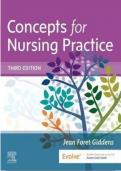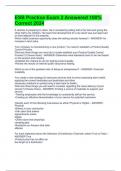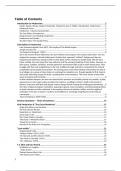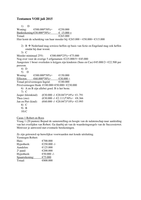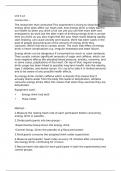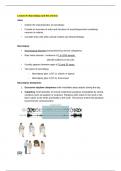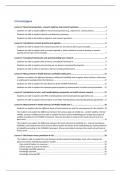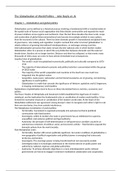‘Edward created a new monarchy’
Assess the validity of this view
Edward IV did create a new monarchy to an extent, as he was able to secure stability on the throne during
his second reign from 1471, imposing his rule on the country and at the same time increasing the finances,
however, his time as a monarch was not one without faults and inevitable problems, seen through his
foreign policy.
Edward IV created a new monarchy in the sense that he brought a fresh, new light to the British royals
through his new system of finance and personal interest in trade. The full effects of his new chamber
system of finance and the land revenues scheme, implemented in the 1460s, were not seen until his second
reign. There was less opportunity for embezzlement since incomes went straight to the chamber and not
the exchequer as it had done previously, allowing for a far more efficient system. Edward created a new
monarchy in the sense that debts hanging over from Henry VI’s reign could be cleared, with the
extortionate sum of £350,000 no longer an issue. He was able to pay this off due to Clarence’s lands being
open to him now that Clarence was dead in February 1476, as well as the increase in customs duties of
£35,000 per year due to the great improvement in trade in Northern Europe. Edward’s new monarchy was
the face of the expansion of trade which benefitted not only him, but the people of England. The monarch
showed his own interest in trade and was actively involved in tin, wool and cloth exports. In 1483 he fuelled
this successful interest by granting a license to two Italians to introduce 20 craftsmen into England who
would then teach new methods of finishing and dyeing. This only helped shape the face of the monarchy
into a active king who had a desire to help his people. His great finances were further reinforced through
commercial treaties with Burgundy, France and the Hanseatic League which would only increase their
relations, something which needed to be done. This was made easier by the lack of war and instances of
piracy, helped by the Treaty of Picquiny 1475 which lifted restrictions on English merchants: they now could
trade with France instead of Burgundy, benefitting them since it was now a bigger market. France had to
pay 50,000 gold crowns to Edward every year which resulted in the people of England not facing any
parliamentary taxation for the following years of Edward’s reign – this only increased their profits. Edward’s
new monarchy was the face of improved finances and in turn created content subjects, allowing his rule to
be smoother than that of Henry VI’s and raising his status and reputation too.
Edward IV had better organisation in the localities where order could be imposed – he was able to trust in
men to control their own areas as sending orders from Westminster was not efficient or actually
worthwhile. For example, he relied on the Stanleys in Lancashire and Cheshire and was able to take their
advice. After 1471 Edward relied on men of ability and from lower ranks, which although unusual to not
use previous noble men, it worked and allowed him to put his trust in the most loyal men, such as Lord
Hastings and Bishop Morton. Hastings served under Edward for his whole reign and Morton later went on
to serve under Henry VII which shows how the desire for land and power is not important to them, they
are there to fulfil their duty to the new king – this creates an image of a new monarchy; one that isn’t
tainted by greed and selfishness. Edward relied on nobility to carry out their traditional role of keeping
peace in their lands and if someone failed at the task, he wasn’t shy to remove them and replace with a
more competent figure. This highlights how his reign was strong – he showed no weakness, and this can
be seen through the death of his own brother, Clarence.
Edward didn’t face any serious rebellion at home which shows how his rule was respected. Whilst there
was rebellion in 1471 in Kent from the cousin of Warwick, Thomas, Bastard of Fauconberg, there was
nothing major after 1471 which reinforces how his new policies of law and order were working. Edward
even gave pardons to most people who hadn’t supported him previously, such as Lord Stanley, implying he
did not feel the threat of attack or disloyalty anymore. It was said there was less rebellion under Edward
once Earl Rivers was in charge of the Council of Wales in the name of Edward’s son from 1479, highlighting
how Edward could trust in people to run areas of the country successfully in his name. His new monarchy
was one of a relaxed nature where he did ignore some corruption in the justice system and in some cases,
Assess the validity of this view
Edward IV did create a new monarchy to an extent, as he was able to secure stability on the throne during
his second reign from 1471, imposing his rule on the country and at the same time increasing the finances,
however, his time as a monarch was not one without faults and inevitable problems, seen through his
foreign policy.
Edward IV created a new monarchy in the sense that he brought a fresh, new light to the British royals
through his new system of finance and personal interest in trade. The full effects of his new chamber
system of finance and the land revenues scheme, implemented in the 1460s, were not seen until his second
reign. There was less opportunity for embezzlement since incomes went straight to the chamber and not
the exchequer as it had done previously, allowing for a far more efficient system. Edward created a new
monarchy in the sense that debts hanging over from Henry VI’s reign could be cleared, with the
extortionate sum of £350,000 no longer an issue. He was able to pay this off due to Clarence’s lands being
open to him now that Clarence was dead in February 1476, as well as the increase in customs duties of
£35,000 per year due to the great improvement in trade in Northern Europe. Edward’s new monarchy was
the face of the expansion of trade which benefitted not only him, but the people of England. The monarch
showed his own interest in trade and was actively involved in tin, wool and cloth exports. In 1483 he fuelled
this successful interest by granting a license to two Italians to introduce 20 craftsmen into England who
would then teach new methods of finishing and dyeing. This only helped shape the face of the monarchy
into a active king who had a desire to help his people. His great finances were further reinforced through
commercial treaties with Burgundy, France and the Hanseatic League which would only increase their
relations, something which needed to be done. This was made easier by the lack of war and instances of
piracy, helped by the Treaty of Picquiny 1475 which lifted restrictions on English merchants: they now could
trade with France instead of Burgundy, benefitting them since it was now a bigger market. France had to
pay 50,000 gold crowns to Edward every year which resulted in the people of England not facing any
parliamentary taxation for the following years of Edward’s reign – this only increased their profits. Edward’s
new monarchy was the face of improved finances and in turn created content subjects, allowing his rule to
be smoother than that of Henry VI’s and raising his status and reputation too.
Edward IV had better organisation in the localities where order could be imposed – he was able to trust in
men to control their own areas as sending orders from Westminster was not efficient or actually
worthwhile. For example, he relied on the Stanleys in Lancashire and Cheshire and was able to take their
advice. After 1471 Edward relied on men of ability and from lower ranks, which although unusual to not
use previous noble men, it worked and allowed him to put his trust in the most loyal men, such as Lord
Hastings and Bishop Morton. Hastings served under Edward for his whole reign and Morton later went on
to serve under Henry VII which shows how the desire for land and power is not important to them, they
are there to fulfil their duty to the new king – this creates an image of a new monarchy; one that isn’t
tainted by greed and selfishness. Edward relied on nobility to carry out their traditional role of keeping
peace in their lands and if someone failed at the task, he wasn’t shy to remove them and replace with a
more competent figure. This highlights how his reign was strong – he showed no weakness, and this can
be seen through the death of his own brother, Clarence.
Edward didn’t face any serious rebellion at home which shows how his rule was respected. Whilst there
was rebellion in 1471 in Kent from the cousin of Warwick, Thomas, Bastard of Fauconberg, there was
nothing major after 1471 which reinforces how his new policies of law and order were working. Edward
even gave pardons to most people who hadn’t supported him previously, such as Lord Stanley, implying he
did not feel the threat of attack or disloyalty anymore. It was said there was less rebellion under Edward
once Earl Rivers was in charge of the Council of Wales in the name of Edward’s son from 1479, highlighting
how Edward could trust in people to run areas of the country successfully in his name. His new monarchy
was one of a relaxed nature where he did ignore some corruption in the justice system and in some cases,

